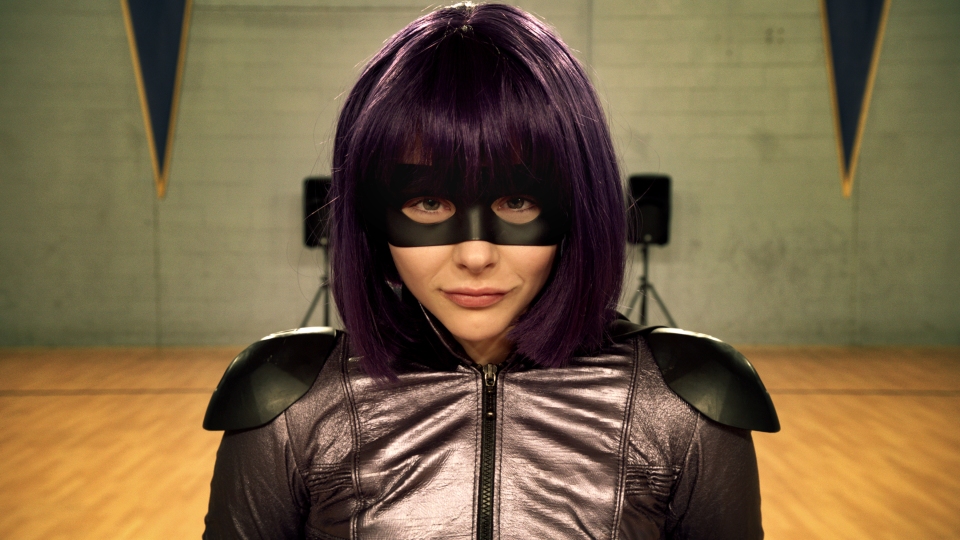Home » Posts tagged 'Guillermo Del Toro'
Tag Archives: Guillermo Del Toro
Oscar Reflections

I know, I know, the awards were ages ago. I’ve been busy, whaddya want? Despite the various changes that took place, I enjoyed the Oscars ceremony. The absence of a host did not adversely affect things, although the opening speech from Maya Rudolph, Tina Fey and Amy Poehler suggested that any or all of these comedians would make excellent hosts in the future.

Other presenters were also entertaining, and it was especially pleasing to see the acting winners of last year presenting the awards for this year in pairs, Gary Oldman and Alison Janney presenting Leading Actor to Rami Malek for Bohemian Rhapsody while Francis McDormand and Sam Rockwell presented Leading Actress to Olivia Colman for The Favourite, whose acceptance speech was one of the most moving.

Alfonso Cuarón spent a lot of time on the stage, winning three awards personally for Roma, Foreign Language Film, Cinematography and Directing, the last of which was affectionately presented to him by his friend and last year’s winner, Guillermo Del Toro.

Performance highlights included the various nominees for Original Song, especially the eventual winner of this award, ‘Shallow’ (from A Star Is Born) performed by Lady Gaga and Bradley Cooper. Melissa McCarthy and Brian Tyree Henry appeared in hilarious costumes that incorporated elements of all the nominees for Costume Design, was another highlight.
Some of the most significant speeches came from the newcomers, especially those in the Short Film categories. For their winning Documentary (Short), Period. End of Sentence, Rayka Zehtabchi and Melissa Berton gave an impassioned and empowering speech about women’s rights and the need for films like theirs to get this kind of attention. Similarly, Domee Shi and Becky Neiman-Cobb were inspiring as they received the award for Short Film (Animated) for their charming Bao. And with his first competitive Oscar win, Spike Lee gave a jubilant celebration alongside his co-winners Charlie Wachtel, David Rabinowitz and Kevin Willmott, seeming to climb up the much longer form of his friend Samuel L. Jackson to receive a congratulatory embrace.
As is often the case, however, the Oscars are dogged with as much controversy as glamour. The most heated debate has been around Best Picture, and with good reason. In a year when such unusual fare as Roma and The Favourite and such provocative offerings as BlacKkKlansman were in contention, for the Academy to reward Green Book feels like a conservative cop-out. I don’t think Green Book is a bad film, but it seems remarkably unremarkable. Little in its subject matter or film style stood out, especially in comparison to the distinctive style and unusual content of the films mentioned above.

As is so often the case, the suspected politics of the Oscars are illuminating. Green Book presents a very simplistic view of US race relations, and it has been described disparagingly as Driving Miss Daisy with the racist in the front. Green Book charts the resolution of racism through a tale of one white man shaking off his prejudices, and in doing so saves a black man with companionship. It’s a white saviour story, where the journey of the white saviour is more prominent than that of the black man who is ‘saved’. It is therefore easy to see why Green Book’s victory annoyed Spike Lee as well as others. I won’t say I’m angry, but I am disappointed that after radical and surprising choices in recent years, Green Book feels like a Best Picture winner from earlier, safer times. Wackier choices next time, I hope.
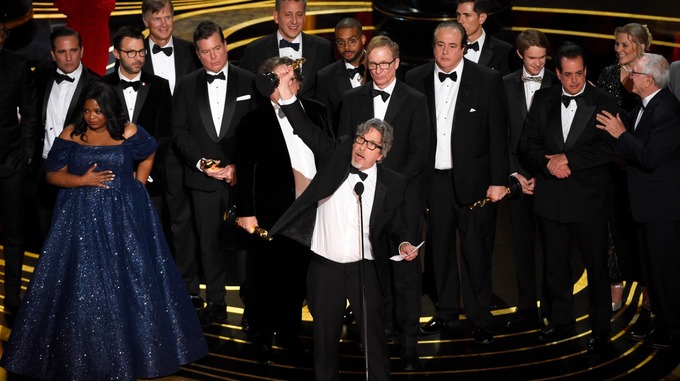
Review of the Year – Part One: Award Season
The start of the movie year is largely filled with awards contenders, and as a fan of awards I make a point of seeing as many of the nominees as I can. Kicking off 2018 for me was the film best known for a sudden recasting, as Ridley Scott’s All The Money In The World featured the removal of Kevin Spacey and rapid replacement with Christopher Plummer. While the film itself is competent if uninspired, the willingness of the filmmakers, especially Scott himself, to engage with and take seriously the debates over appropriate behaviour make this film something of a landmark. And Mr Plummer did not do too badly, earning an Oscar nomination for his trouble.

All The Money In The World did not concern the Academy members otherwise, nor indeed did one of the Best Picture nominees, The Post. Nominated for Best Picture and Best Actress (21 nominations, Meryl, really?), The Post was nonetheless a gripping, urgent and timely tale of the importance of the press as well as being a significant story of female empowerment. However, it was a rather safe film in terms of awards attention, so I was pleased to see other films honoured.

Another safe bet, which did pick up some awards, was Darkest Hour, with Gary Oldman and a tonne of prosthetics bringing Winston Churchill to quivering yet unwavering life. I found Darkest Hour a patchy film, but there is no denying the strength of Oldman’s performance.

Two of the nominees for Original Song I missed on their original release but caught up with later. The first of these, The Greatest Showman, proved a hollow effort that raised interesting ideas which then got lost in the seemingly heady rush to the end for, well, not much. Far more rewarding was Coco, a charming, funny and yet bittersweet tale that not only picked up the Oscar for Original Song, but also continued Pixar’s triumphs in the Animated Feature category.
I count four of the Best Picture nominees in my top films of the year, and had a tough time picking which I wanted to win. Phantom Thread may have been the most meticulously crafted film of the year: every comma of the script, every cut to a different angle, every raised eyebrow of its stellar cast as precise and perfect as Reynolds Woodcock’s (Daniel Day-Lewis) intricate creations. Meanwhile, Greta Gerwig’s Lady Bird reminded audiences and Academy members alike that women do make interesting films and that there are interesting stories about women (shocking!), and that Saoirse Ronan can do no wrong.
The big hitters at the award ceremonies, and two of the best films of the year, were Three Billboards Outside Ebbing, Missouri and the eventual winner, The Shape of Water. I love both films, finding Three Billboards Outside Ebbing, Missouri to be heartbreaking and uplifting in equal measure, with plot, character, performance, direction, editing and music held in near perfect balance. The Shape of Water is, for me, less accomplished overall, as its Cold War narrative strand feels artificially attached to the central fishy love story. However, for the Academy to reward a fantastical monster film gets a thumbs-up from me, and Guillermo Del Toro’s magnificent direction, not to mention progressive gender politics, makes the film a major winner in my view.
Mid-Year Report
Jiminy jump cuts, we’re half way through the year! 2018 has already given us Brexit shenanigans, the savaging of civil liberties by the US government and sporting events that some people enjoy. In the movie world, we saw a fantasy film win Best Picture, a superhero film with a largely black cast become a box office success, and fan responses to Star Wars reached a new low. The cinematic offerings of 2018 thus far have, by and large, been impressive. From varied award bait to adaptations of video games, novels and stage plays, franchise instalments to indie gems, January to June provided film delights aplenty. Now at the half-year point, I offer my top six of the first six months on 2018.
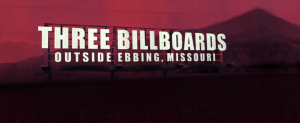 Traditional as it was, this was the Best Picture nominee that impressed me the most. Were I a member of AMPAS, I might not have voted it for it for political reasons (more on that later), but this is the most impressive film of the year for me so far.
Traditional as it was, this was the Best Picture nominee that impressed me the most. Were I a member of AMPAS, I might not have voted it for it for political reasons (more on that later), but this is the most impressive film of the year for me so far.
 An extraordinary experience, to such an extent that after I saw it, I needed to take a walk just to let it settle. Describing such a exquisitely cinematic experience in words is hard (though I did it anyway), so all I will say here is that you need to see it. Off you go, you can read the rest of this later.
An extraordinary experience, to such an extent that after I saw it, I needed to take a walk just to let it settle. Describing such a exquisitely cinematic experience in words is hard (though I did it anyway), so all I will say here is that you need to see it. Off you go, you can read the rest of this later.
 The culmination of ten years of world and story building for Marvel Studios, Infinity War manages to do that thing you don’t expect in a franchise instalment – be surprising. Blending a myriad of characters and narrative threads, and going to strange thematic places, Infinity War continues Marvel’s mastery of the superhero genre.
The culmination of ten years of world and story building for Marvel Studios, Infinity War manages to do that thing you don’t expect in a franchise instalment – be surprising. Blending a myriad of characters and narrative threads, and going to strange thematic places, Infinity War continues Marvel’s mastery of the superhero genre.
 Were I a member of AMPAS, I would probably have voted for this to win Best Picture, since it is a different sort of nominee that manages to blend the fantastical and the real, the whimsical and the brutal. Guillermo Del Toro has crafted a remarkable oeuvre and, while this is a career highlight, I hope he continues to give us further brilliant pieces of cinema.
Were I a member of AMPAS, I would probably have voted for this to win Best Picture, since it is a different sort of nominee that manages to blend the fantastical and the real, the whimsical and the brutal. Guillermo Del Toro has crafted a remarkable oeuvre and, while this is a career highlight, I hope he continues to give us further brilliant pieces of cinema.
 Perhaps the oddest film this year, one that I can only recommend in the sense that is an exquisitely crafted piece of cinema. Paul Thomas Anderson’s period romantic drama about an insufferable dressmaker could be sold on its talent, but to view it is to enter into a fully realised and often uncomfortable world.
Perhaps the oddest film this year, one that I can only recommend in the sense that is an exquisitely crafted piece of cinema. Paul Thomas Anderson’s period romantic drama about an insufferable dressmaker could be sold on its talent, but to view it is to enter into a fully realised and often uncomfortable world.
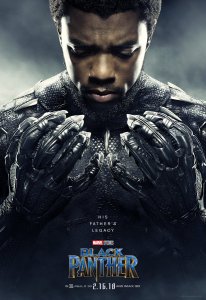 It says something about a superhero film when you find yourself considering the foreign policy of a fictional country, the society of which is based entirely on a fictional element. It means that the film is working so well on a generic level that you want to apply its conceits to the real world. Marvel’s venture into Afro-futurism combined super-powered thrills with debates between isolationism and interventionism, and without labouring the point struck a blow for cinematic equality.
It says something about a superhero film when you find yourself considering the foreign policy of a fictional country, the society of which is based entirely on a fictional element. It means that the film is working so well on a generic level that you want to apply its conceits to the real world. Marvel’s venture into Afro-futurism combined super-powered thrills with debates between isolationism and interventionism, and without labouring the point struck a blow for cinematic equality.
 Only one real stinker so far, and I hope that I don’t see a worse film this year. Red Sparrow had so much potential, considering its subject, its themes and talent. That made the disappointment of watching this tedious, turgid, brutal, nasty and ultimately hollow film all the more crushing.
Only one real stinker so far, and I hope that I don’t see a worse film this year. Red Sparrow had so much potential, considering its subject, its themes and talent. That made the disappointment of watching this tedious, turgid, brutal, nasty and ultimately hollow film all the more crushing.
Will the top (and bottom) films of the year include these entries or others? Time will tell, so keep viewing with Vincent to see where the year goes.
90th Oscar Predictions Part Four: Writing Away
 Adapted Screenplay
Adapted Screenplay

This category has an interesting bunch of scripts, drawn from novels and memoirs, and it’s great to see a comic book adaptation in there. For purely personal reasons, I’d love a superhero movie to boast a writing Oscar, so Logan is my pick. However, as this is the only award one of the Best Picture nominees is likely to win, and since the writer is a respected doyen of the film industry, I predict James Ivory will walk away with this award.
Call Me by Your Name, James Ivory (predicted winner)
The Disaster Artist, Scott Neustadter & Michael H. Weber
Logan, Scott Frank & James Mangold and Michael Green (preferred winner)
Molly’s Game, Aaron Sorkin
Mudbound, Virgil Williams and Dee Rees
Original Screenplay
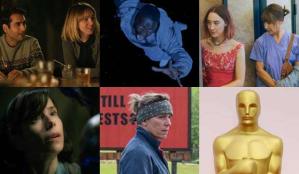
The Best Picture winner always wins one of these other awards: Writing, Editing, Directing. For reasons to be highlighted below, Three Billboards Outside Ebbing, Missouri is not likely to win Editing, and it is not nominated for Directing. Therefore, I confidently predict that Martin McDonagh will pick up the Oscar for Three Billboards Outside Ebbing, Missouri. But personally, I would vote for Greta Gerwig’s warm, witty and rather wonderful script for Lady Bird.
The Big Sick, Emily V. Gordon & Kumail Nanjiani
Lady Bird, Greta Gerwig (preferred winner)
The Shape of Water, Guillermo del Toro, Vanessa Taylor
Three Billboards Outside Ebbing, Missouri, Martin McDonagh (predicted winner)
90th Annual Academy Awards

DISCLAIMER: I have not seen any of the nominees in the categories of Foreign Language Film, Documentary Feature, Documentary Short Subject, Animated Short, Live Action Short Film, so I have no view on them.
When it comes to the Oscars, one can pick what is likely to win, and what one would like to win (or, according to the more arrogant out there, what should win). On the first point, the easy answer is what has won so far. If a film has won awards at the Golden Globes and the BAFTAs, not to mention various critical awards and those of the various filmmaking guilds of America, it is likely to pick up Best Picture at the Oscars. This is not a hard and fast rule, but it is a tendency.
Complete Picture
As previously mentioned, I predict that Three Billboards Outside Ebbing, Missouri will pick up Best Picture. What I would vote for, were I a member of the Academy of Motion Picture Arts and Sciences, is a different matter. Of the nine nominees, I was most impressed by Dunkirk, but World War II films are such clichéd Best Picture winners that I would not vote for it. In a year when focus is on gender relations in the film industry, I want to support a film that has something positive to say about women, and is also something outside the generic norm. Lady Bird and The Shape of Water fulfil those criteria, and the latter is also a fantasy film, extremely rare in these circles. Therefore, in my fantasy AMPAS vote, I would pick The Shape of Water.
Best Picture
The Shape of Water (preferred winner)
Three Billboards Outside Ebbing, Missouri (predicted winner)

Directing Inquiries
Three Billboards Outside Ebbing, Missouri is a surprising lead contender for Best Picture because Martin McDonagh is not nominated for Achievement in Directing. If he were, I would predict a victory, but as he is not, I have the same dilemma. Much as I love Christopher Nolan, he has opted for a safe award genre with his World War II thriller. As impressively directed as Dunkirk is, I want to see him garner awards for science fiction films like Inception and Interstellar. Therefore, I champion another of my favourite directors, Guillermo Del Toro. Handily, I suspect he will actually walk away with the award anyway, which will make me happy.
Directing
Paul Thomas Anderson, Phantom Thread
Guillermo Del Toro, The Shape of Water (predicted and preferred winner)
Greta Gerwig, Lady Bird
Christopher Nolan, Dunkirk
Jordan Peele, Get Out

Animated Feature
I have not seen any of these, but I would be flabbergasted if Coco did not bring Pixar another award.
The Boss Baby, Tom McGrath, Ramsey Ann Naito
The Breadwinner, Nora Twomey, Anthony Leo
Coco, Lee Unkrich, Darla K. Anderson (predicted winner)
Ferdinand, Carlos Saldanha
Loving Vincent, Dorota Kobiela, Hugh Welchman, Sean Bobbitt, Ivan Mactaggart, Hugh Welchman

Crimson Peak
“Ghosts are real” insists heroine Edith Cushing (Mia Wasikowska) in the opening voiceover of Guillermo Del Toro’s spine-tingling Crimson Peak. The viewer of this simmering gothic romance has little trouble believing Edith’s assertion, as ghosts appear in such crawlingly tactile form that you may check there are no cold fingers touching you. Nor are these apparitions out of place, as Kate Hawley’s sumptuous costumes and Thomas E. Sanders’ lustrous production design immediately draw the viewer into an evocative supernatural world. Playing as an unabashed haunted house story, Crimson Peak unfolds with confidence and cunning, as Edith finds life with her new husband Sir Thomas Steele (Tom Hiddleston) and his sister Lucille (Jessica Chastain) to be far from comforting. Del Toro rewards expectations by playing to the genre, utilizing his love for ghosts and monsters and sharing these with the viewer. Along the way there are moments of brutal violence and sinister motives, as well as tensions around modernity and tradition, gender, nationality and class. The result is a heady and potent mix, lovingly rendered and gorgeously presented in another triumph for this distinctive auteur.
My Views of 2013 at the Movies
On the twelfth day of Christmas
The movies gave to me
Twelve Enders gaming
 Eleven desolations
Eleven desolations
 Ten victor tributes
Ten victor tributes
Nine iron men
 Eight men of steel
Eight men of steel
Seven rushing racers
Six piney places
 MIS-TER BANKS
MIS-TER BANKS
 Four astronauts
Four astronauts
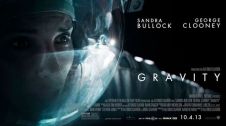 Three Abe-necdotes
Three Abe-necdotes
 Two hijackings
Two hijackings
 And Osama Bin Laden.
And Osama Bin Laden.
 That was my top twelve of 2013, but I’m just getting started, as my post for Twelfth Night is my review of 2013, from my limited viewing record. I thought it would be fun to rank and rate every theatrical release of 2013 that I saw, with divisions within them.
That was my top twelve of 2013, but I’m just getting started, as my post for Twelfth Night is my review of 2013, from my limited viewing record. I thought it would be fun to rank and rate every theatrical release of 2013 that I saw, with divisions within them.
A known story that nonetheless pulls you in, taught direction that turns a cold gaze on shadowy events, and a final hour that had my shoulders clenched throughout.
Gripping, frightening, believable and moving. The first film to move me to tears!
Political history comes to life through measured direction that allows stunning performances to dazzle and delight.
The experience of cinema has rarely been so terrifying, gut-clenching and astounding.
Saving Mr. Banks
Touching, moving, charming, funny and a wonderful companion piece to Mary Poppins.
The blue-collar equivalent of gangster epics like Heat and The Departed, fresh and surprising in its narrative structure.
Fabulous charisma meets steely calculation in visceral, terrifying races.
One of the best representations of super powers I’ve seen, combining the fear, exhilaration and plausibility of extraordinary abilities and the choices of those who possess them.
A brilliant portrayal of PTSD as part of a new exploration of heroism.
The Hunger Games: Catching Fire
From children’s games to a growing rebellion, things get darker, deadlier and better.
The Hobbit: The Desolation of Smaug
A further development of Middle Earth with possibly the greatest dragon ever committed to film.
Wonderfully realised science fiction that convincingly goes to strange dark places.
Honourable mentions
Abrams repackages The Wrath of Khan for a new audience, delighting them while seriously hacking off the original fans. Must have done something right.
A hypnotic, mesmerising vision of a mad, bad world.
Fast, smart and with more twists than a corkscrew, Danny Boyle puts the fractured mind on screen.
Gorgeous, lyrical, sober and moving. Malick does it again.
The Secret Life of Walter Mitty
Ben Stiller makes himself and the world around him beautiful and mysterious all at once.
Thor: The Dark World
One of the year’s funniest films, which balances its laughs with thrills and spills aplenty.
Guillermo Del Toro demonstrates again why he is a master of the fantastic.
Could have been better
Atmospheric, gruelling, thought-provoking. A disappointing final act detracts but does not completely negate two hours of superb intensity.
Majestic, sprawling, grand, indulgent. When Tarantino reins it in he delivers genius. If only he would do that more often.
The music was great! The film, wasn’t. So many great elements, but perhaps too much reverence for the source material.
Perfectly serviceable
Jack the Giant Slayer
A furiously fun fairy tale.
About Time
A touching if twee tale of time travel.
Sleek and bleak sci-fi.
Much Ado About Nothing
A decent comedy of misunderstandings. What else has the writer done?
Hopelessly cheesy but in an enjoyable way.
Worst
The World’s End
A rather damp squib ending to an uproarious trilogy.
When the best part of the film is the foreshadowing of the next one, you know something’s gone badly wrong.
A reminder that sometimes you really don’t need a sequel.
Lives fall apart! And no one gets excited. Mental health is a serious issue! And we’re going to cheapen it. Drug companies and medical ethics are really complicated! But more importantly, lesbians are really dangerous to patriarchy! Oh, go away.
Not focused, not funny, not worth it.
Turkey of the Year
So many interesting ideas; a complete lack of exploration. An unconvincing future world and no discernible tension.
Disappointing Instalments
Spoiler Warning
I recently had a conversation with a friend about recent films that we had different responses to, Kick-Ass 2 (Jeff Wadlow, 2013) and The Wolverine (James Mangold, 2013). I found both of these disappointing and my friend thought they were alright. In the case of Kick-Ass 2, my fellow conversant knew that it would not surprise or shock them like the first, and that the only way it could have done would be to change the style of the film. Therefore, the film was enjoyable as an extension to the first, but nothing more. The absence of Big Daddy (Nicolas Cage) was felt, and my friend commented that the story did not have enough suspense, unlike Matthew Vaughn’s original.
Both of us agreed that Hit Girl/Mindy McCready (Chloe Grace Moretz) was the best thing in Kick-Ass 2, so for me, it was disappointing that she was underused and spending time becoming a ‘regular girl’, only for her to abandon that and re-embrace Hit Girl. It is a common trope in superhero narratives that heroes renounce their super identities (see Superman II [Richard Lester, 1980], Spider-Man 2 [Sam Raimi, 2004], The Dark Knight Rises [Christopher Nolan, 2012]), but it tends to be more traumatic and a crisis of identity. Had Kick-Ass 2 focused on that element, it would have been more effective, even as an identity crisis within high school. High school is fertile ground for dramas about identity and finding oneself, so a high school action comedy about Hit Girl would have a lot of potential.
Unfortunately, with Mindy/Hit Girl side-lined, Kick-Ass 2 lacks not only suspense but emphasis, wavering between Dave Lizewski/Kick-Ass and his ongoing ambition, as well as Colonel Stars and Stripes’ (Jim Carrey) Justice Forever band, and the increasing villainy of Chris D’Amico/The Motherfucker (Christopher Mintz-Plasse). The film therefore lacks focus and a coherent theme, essentially trying to play off the original’s feature of having superheroes swear and get badly hurt. But in Kick-Ass, that was a point rather than a gimmick. In Kick-Ass 2, it’s just a gimmick. There are some good sequences, including the final battle and indeed most scenes involving Mother Russia (Olga Kurkulina), and I liked the suggestion of a romance between Mindy and Dave, but overall, the film felt lightweight and uncertain of its meaning.
It used to be the case that sequels were never as good as the originals. Superhero films especially buck that trend, with Spider-Man 2, Blade II (Guillermo Del Toro, 2002), X-2 (Bryan Singer, 2003), The Dark Knight, maybe even Fantastic 4: Rise of the Silver Surfer (Tim Story, 2007) improving what came before. Sadly, it seems that Kick-Ass 2 is what we used to expect from sequels.
The Wolverine is another matter. The X-Men franchise has been very patchy, at its best striking a balance between personal dramas, thrilling action and wider ramifications. The wider ramifications was the major missing feature from The Wolverine, as it is the most intimate and personal film of the franchise thus far. Director James Mangold has a talent for intimate, down-to-earth drama, whether that be the biopic melodrama of Walk The Line (2005) or the terse psychological thrills of Identity (2003). The Wolverine demonstrates that he can still deliver the necessary action spectacle (although perhaps that should be credited more to second unit director, editor and the special effects team), but despite the bullet train sequence and the final battle with Silver Samurai, The Wolverine is remarkably unremarkable, because there seems to be little reason for what is going on. It is essentially the further adventures of Logan, revisiting an old friend, making new ones including a requisite new romance, and I was left thinking ‘So what?’ The spectral presence of Jean Grey (Famke Janssen) was unconvincing, and the most moving moment was Logan’s early communion with a wounded bear. It could have been refreshing to see Logan more vulnerable, like those mentioned above it is an instance of the superhero losing their powers, but the trope of him having to adapt to being hurt was not given enough variety, swiftly becoming repetitive.
To make matters worse, the villain of The Wolverine was very uninteresting, Viper (Svetlana Khodchenkova) little more than a mutant riff on the vicious beauty, which was done far more interestingly with Mystique (Rebecca Romijn/Jennifer Lawrence) and Emma Frost (January Jones) in previous installments. Perhaps if she had been in a position to fight Logan herself, like Lady Deathstrike (Kelly Hu) in X-2, it might have been interesting, but instead she is far from a worthy adversary. The final clash between Wolverine and Silver Samurai was flashy but felt more like an obligation than an organic development, while the sudden reappearance of the bone claws was overly convenient.
Overall, The Wolverine felt lightweight, nothing attached to what was going on. For me, the X-Men films have been most enjoyable when the stakes are high, which they have been previously:
X-Men – the irradiation of the world leaders
X-2 – the death of all mutants and, subsequently, the death of all humans
X-Men: The Last Stand – the ‘cure’ for mutation
X-Men Origins: Wolverine – more personal, but still a campaign against mutant-kind
X-Men: First Class – the Cuban missile crisis and World War Three
The Wolverine – dying man wants to live forever and will steal Logan’s ability to heal so that he becomezzzzzzzzzzzzzzzz
The stakes of The Wolverine are too low and, therefore, the film lacks drama. Ironically, the biggest problem with The Wolverine is the best thing in it – the mid-credits sequences featuring Professor X and Magneto. I had read that Patrick Stewart was going to cameo, but I was not expecting Ian McKellen to show up as well. In addition, the foreshadowing of Trask Industries is another nice detail, demonstrating economic storytelling and raising expectations. I eagerly anticipate X-Men: Days of Future Past (Singer, 2014), combining the elements established in earlier instalments into something both new and familiar. But when the best thing in a film is a scene with no connection to what went on before, then the film as a whole is clearly doing something wrong.
3D or Not 3D, That is the Question – Part II
Two late releases of 2012 were both touted as making great use of 3D. The first was The Hobbit: An Unexpected Journey, the last hugely anticipated and hyped film of the year. Not only would this be a 3D release, Peter Jackson had filmed his return to Middle Earth in 48 frames per second, which would (apparently) create a more vivid, living image. In an interview, Jackson explained that 48 FPS turned the cinema screen into a window, through which one could look into the other world of the film, feeling oneself there in the vividness of the image. By contrast, one review of An Unexpected Journey described it as like looking at an HD television, which rather diminished the cinema experience.
To save money, I saw The Hobbit: An Unexpected Journey in 2D, at 24 FPS. My simple response: we’re back! I loved it – the level of detail applied to every aspect of Middle Earth was superb. The Hobbit is a more homely tale than The Lord of the Rings, and more time is spent in Bag End, with the young Bilbo (Martin Freeman) bustling about with his crockery and preparing supper. Once Gandalf (Ian McKellen) and the dwarves arrive, the party is a prolonged affair that feels hectic yet comfortable and homely. This was a group of people I’d be happy to sit down to dinner with.
Despite the length of the scene, and the film as a whole, Jackson paces the action well, moving smoothly from set piece to set piece. An Unexpected Journey could be criticised for having a plot that consists entirely of set pieces, but when that it is the plot of the novel it is hard to see the film being different. And what set pieces, from the prologue featuring the coming of Smaug and the exodus of the Dwarves, to a dangerous walk along narrow mountains paths as living mountains batter each other to pieces; from the desperate dash and spell-casting of Radagast (Sylvester McCoy) in Mirkwood to the helter-skelter running battle through the halls of the Goblin King; and the climatic battle with the Orcs of Azog the Defiler (Man Bennett) aboard their Wargs at the edge of a precipice, on a toppling tree, which is on fire. The one scene I could have done without featured the three trolls, but since they are referenced and even appear in The Fellowship of the Ring, I understand why it had to be included.
Perhaps the most effective set piece, however, is a battle of wits rather than swords, in the form of Bilbo’s game of riddles with Gollum (Andy Serkis). Gollum’s first appearance acknowledges the viewer’s familiarity with what has previously been seen in The Lord of the Rings, as he is heard before he appears, muttering and hacking, and it takes time before he is revealed in his entirety. The game of riddles is a smooth, engaging sequence, allowing both performers space to express their situations – in Bilbo’s case fear and increasing desperation; for Gollum, eagerness and increasing frustration. The scene segues perfectly into a chase, and despite the relative unimportance of the Ring to the overall plot of The Hobbit, it still receives emphasis befitting the viewer’s familiarity with the magical object, as well as Bilbo’s important choice when he has Gollum at his mercy.
The best element of An Unexpected Journey is its eponymous character, as Martin Freeman delivers one of the most engaging performances of the year. More varied than Gandalf, less doom-laden than Frodo, Bilbo stands out from the other characters of the Tolkien-verse by the possession of a sense of humour. The Lord of the Rings can be criticised for being rather dour, but The Hobbit had several moments that were laugh out loud funny (personal favourite: comedy faint). Similarly, whereas the Fellowship was quickly assembled and the drama focused upon it falling apart, much of the drama in An Unexpected Journey is concerned with Bilbo proving himself to his travelling companions, especially Thorin (Richard Armitage). Described as an amalgamation of Aragorn and Boromir, Thorin is the grim-faced and troubled hero, and the antagonistic development of his relationship with Bilbo gives the film real heart. The moment at which the reluctant hobbit and the obsessed dwarf reconcile is moving and heart-warming, and helps to set up what is to come. For The Hobbit: The Desolation of Smaug, we can expect a united company encountering further dangers.
Everything that worked about An Unexpected Journey worked because of an intelligent script by Jackson and his co-writers Phyllida Boyens, Fran Walsh and Guillermo Del Toro, Weta’s superb production design, bravura performances from all concerned, and Jackson’s fluid direction that easily slips between different plot points and gives attention to different characters, drawing the viewer into this magical world. There were a couple of points when I wondered how it would look in 3D, and whether 48 FPS would add anything to the experience. Perhaps it would, but that enhancement would not be integral to what was on screen. The high definition digital filming does make a different, as that itself creates a more detailed image than film can provide. Digital film has been growing ever more prevalent, especially since Michael Mann gave LA a digital noir look in Collateral. Mann’s own Miami Vice and Public Enemies made further use of HD digital film, and more recently Roger Deakins’ digital cinematography was one of the most striking elements of Sam Mendes’ Skyfall. The Hobbit: An Unexpected Journey looks gorgeous in HD, as we see the fine lines of the actors’ features, the individual blades of grass in the Shire, the leaves of Mirkwood and the intricate details of Elvish architecture in Rivendell. Digital film adds a vibrancy and immediacy to the cinema image, which we can have at home as well thanks to Blu-Ray and HD TV, so I am all for this particular development in the cinematic art form. 3D would be fine if it didn’t cost extra, but without it, I don’t think I’m missing much.










































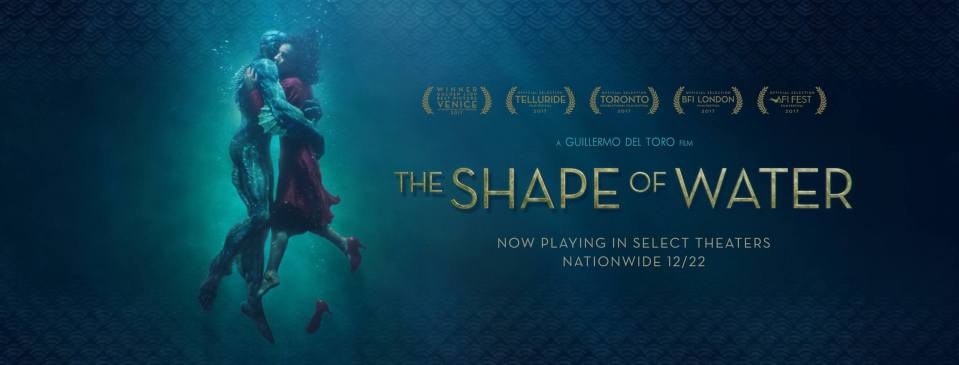 In his acceptance speech for Best Director at the British Academy Film Awards, Guillermo Del Toro paid tribute to Mary Shelley. This attention highlights the significance of the female voice in Del Toro’s films, which in The Shape of Water is significant by its absence. Eliza Esposito (Sally Hawkins) mutely observes the world of early 1960s Baltimore, her silence one of several forms of alienation depicted in the film. Eliza’s friend and fellow janitor, Zelda Fuller (Octavia Spencer) is alienated from her distant husband and also from others by racial prejudice, especially that which is exhibited by Richard Strickland (Michael Shannon), who seems intent on alienating himself from everyone. Eliza’s neighbour Giles (Richard Jenkins) is alienated both professionally and personally by his sexuality; Dr Robert Hoffstetler (Michael Stuhlbarg) is alienated from different groups by his commitment to science over politics; and in the heart of the research institute where much of the drama takes place, the Amphibian Man (Doug Jones) is alienated by being different to everyone around him. Yet amongst these forms of alienation, Del Toro weaves a delicate and beautiful story of connection, beauty that includes Paul D. Austerberry’s exquisite production design as well as Alexandre Desplat’s haunting and evocative score. As in Pan’s Labyrinth and The Devil’s Backbone, the fantastic is laced with the political as well as often brutal violence. More distinctly, there is an unashamed embrace of female sexuality, as Eliza is defined not by her disability but by her recognition of mutuality, mutuality that connects her to all around her despite apparent differences. This extends to the film as a whole which, despite its overt strangeness, offers a universality that envelops its characters and audience in a shifting and all-encompassing shape, rather like that of water.
In his acceptance speech for Best Director at the British Academy Film Awards, Guillermo Del Toro paid tribute to Mary Shelley. This attention highlights the significance of the female voice in Del Toro’s films, which in The Shape of Water is significant by its absence. Eliza Esposito (Sally Hawkins) mutely observes the world of early 1960s Baltimore, her silence one of several forms of alienation depicted in the film. Eliza’s friend and fellow janitor, Zelda Fuller (Octavia Spencer) is alienated from her distant husband and also from others by racial prejudice, especially that which is exhibited by Richard Strickland (Michael Shannon), who seems intent on alienating himself from everyone. Eliza’s neighbour Giles (Richard Jenkins) is alienated both professionally and personally by his sexuality; Dr Robert Hoffstetler (Michael Stuhlbarg) is alienated from different groups by his commitment to science over politics; and in the heart of the research institute where much of the drama takes place, the Amphibian Man (Doug Jones) is alienated by being different to everyone around him. Yet amongst these forms of alienation, Del Toro weaves a delicate and beautiful story of connection, beauty that includes Paul D. Austerberry’s exquisite production design as well as Alexandre Desplat’s haunting and evocative score. As in Pan’s Labyrinth and The Devil’s Backbone, the fantastic is laced with the political as well as often brutal violence. More distinctly, there is an unashamed embrace of female sexuality, as Eliza is defined not by her disability but by her recognition of mutuality, mutuality that connects her to all around her despite apparent differences. This extends to the film as a whole which, despite its overt strangeness, offers a universality that envelops its characters and audience in a shifting and all-encompassing shape, rather like that of water.



